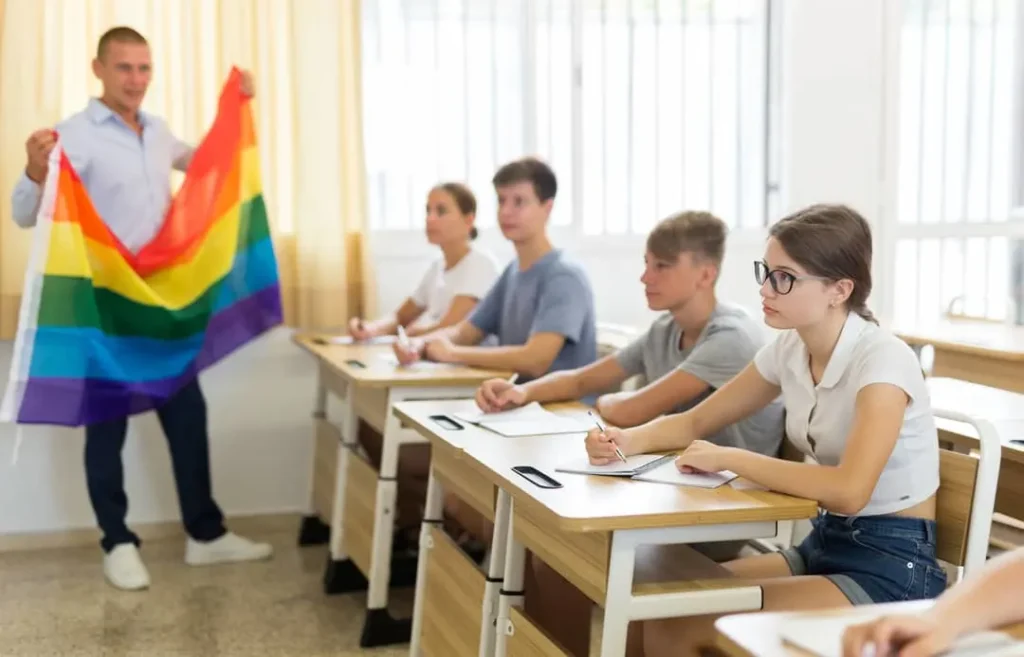In recent years, the American education system has been at the center of heated debates about inclusivity in school curriculums. One of the most contentious areas has been the inclusion or exclusion of LGBTQ-related topics in sex education. With the rise of mechanisms that make it easier for individuals to file complaints against curriculums for being “not inclusive,” this issue has reached new heights. While inclusivity is undeniably an important value, the question arises: are we crossing the line by forcing specific content into the curriculum that some believe should be a personal choice to explore outside of school?
The Background of the Cajon Valley Case

A recent case in the Cajon Valley Union School District underscores this dilemma. The district’s decision to erase mentions of LGBTQ education from its sex ed curriculum sparked a wave of complaints. Students reportedly felt marginalized, with some questioning their own sexuality but unable to discuss it in the classroom. An employee filed a formal complaint with the State Board of Education, arguing that the curriculum violated the education code by excluding these topics. The state found the complaint valid, labelling the curriculum illegal, and mandated changes, including proof of inclusivity and faculty training to ensure these lessons are carried out effectively.
This case highlights a broader trend: an increasing ease with which individuals or groups can challenge school curriculums, potentially overriding the preferences of local communities and parents. While inclusivity is an admirable goal, mandating such changes raises serious concerns about the role of public education and the line between institutional responsibility and personal choice.
The Slippery Slope of Over-Regulation
One of the main issues with making it easy to file complaints against “non-inclusive” curriculums is the potential for overreach. The education system, ideally, should provide a broad and balanced foundation of knowledge while leaving room for families and individuals to explore specific interests and values outside of school. However, by requiring that schools cater to every conceivable perspective, we risk diluting the primary purpose of education: to equip students with fundamental skills and knowledge.
Sex education, in particular, is a highly sensitive topic that has long been influenced by cultural, religious, and moral beliefs. Many parents feel that such discussions about gender identity and sexual orientation are deeply personal and should be addressed within the family or through self-directed learning, rather than being mandated by the state. Making it easier to file complaints about curriculum “exclusivity” could lead to an endless cycle of challenges, revisions, and legal battles that detract from the primary goal of education.
The Role of Schools vs. Personal Exploration
Advocates for a more inclusive curriculum argue that schools have a duty to reflect the diversity of their student populations. While this is a valid point, it’s worth questioning whether public education is the appropriate forum for delving into such nuanced and often controversial topics. Education should focus on teaching universally applicable subjects like math, science, history, and basic health, leaving space for personal beliefs and exploration.
For those interested in LGBTQ topics, there are ample resources available outside of school. Libraries, online platforms, community organizations, and even extracurricular clubs provide opportunities for students to explore these subjects in a setting that feels comfortable and voluntary. By shifting the responsibility of exploring LGBTQ-related topics to individual students and their families, schools can avoid alienating parents who may feel that such discussions conflict with their values.
A Double-Edged Sword for Inclusivity
Ironically, the push for mandatory inclusivity in school curriculums can sometimes have the opposite effect. When districts like Cajon Valley Union are forced to alter their curriculums under the threat of legal consequences, it fosters resentment and division rather than understanding and acceptance. Many parents and educators may feel that their voices are being ignored, leading to a backlash against inclusivity initiatives.
Moreover, forcing inclusivity into the curriculum doesn’t necessarily translate to genuine understanding or empathy among students. In fact, mandatory lessons can often come across as performative, doing little to address the root causes of discrimination or bullying. True inclusivity is best achieved through organic conversations, empathy-building exercises, and fostering an environment where all students feel safe to express themselves, not by imposing rigid requirements on the curriculum.
Finding a Balanced Approach
The key to resolving this issue lies in finding a balance between inclusivity and respecting individual freedoms. Schools should strive to create a welcoming environment for all students, but this doesn’t mean that every aspect of identity needs to be explicitly addressed in the classroom. Instead of mandating specific content, schools could focus on fostering critical thinking skills and teaching students how to seek out reliable information on their own.
For example, rather than dedicating entire lessons to LGBTQ issues, schools could incorporate discussions about diversity and respect into broader health and social studies curriculums. This approach would ensure that all students feel acknowledged without singling out specific groups or imposing contentious viewpoints on families who may not agree with them.
What’s Next?
The increasing ease with which complaints can be filed against “non-inclusive” curriculums risks turning public education into a battleground for cultural and ideological disputes. While inclusivity is an important goal, it’s crucial to consider the broader implications of mandating specific content in school curriculums. Topics like LGBTQ education, while significant, are best explored on an individual basis, outside the constraints of public education.
Ultimately, schools should focus on their primary mission: providing students with a solid academic foundation and the tools to think critically about the world around them. By leaving space for personal exploration and respecting diverse perspectives, we can create a more balanced and effective education system that serves everyone.
